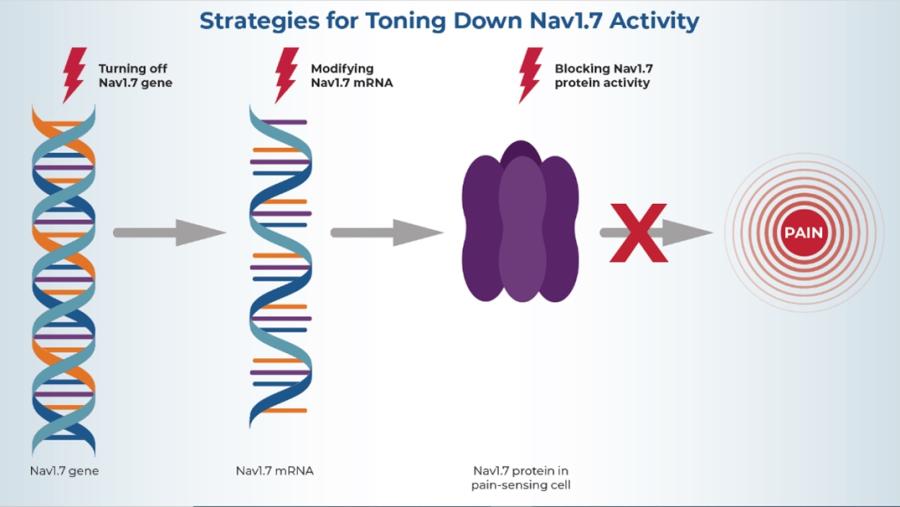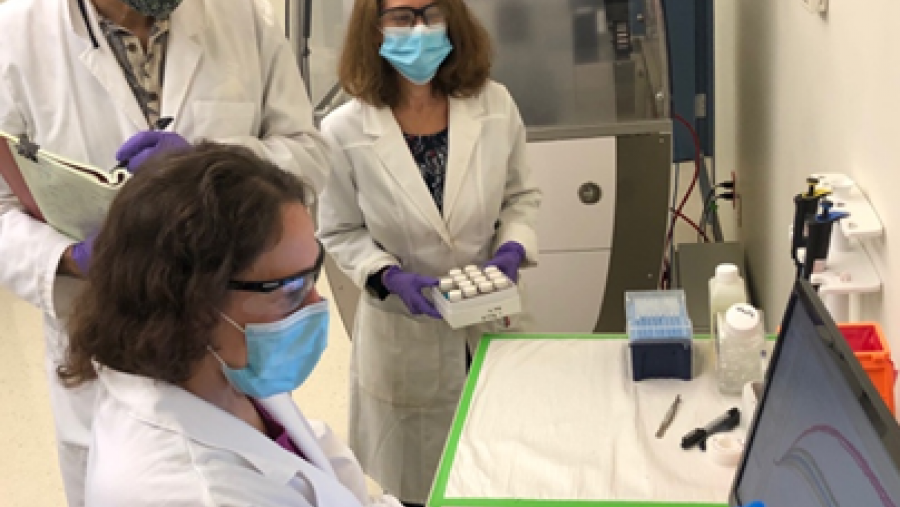Development and Optimization of Non-Addictive Therapies to Treat Pain
Overview
The Research Need
Overreliance on prescription opioids for chronic pain management has contributed to the opioid overdose crisis. At the same time, millions of Americans do not have adequate relief for pain. New non-addictive therapies for effective pain management as viable alternatives to opioids are urgently needed.
About the Program
This program will facilitate research and development in academic and small business settings to evaluate unexplored targets for clinical testing readiness. Research projects will include collaborative, interdisciplinary team science efforts as well as milestone-driven studies with the goal of filing Investigational New Drug (IND) applications with the U.S. Food and Drug Administration for clinical exploration and potential future commercialization. A team-based research framework allows candidate molecules to be tried, validated in various models, prepped for testing in humans, then moved quickly into clinical testing in the HEAL Early Phase Pain Investigation Clinical Network (EPPIC-Net) or other Phase 2 clinical studies.
The program also features the Non-addictive Analgesic Therapeutics Development program, which provides resources for a variety of activities necessary for early drug development. This includes access to consultants and contract research organizations with resources and extensive experience in the biotech and pharmaceutical industry. Available services include expertise related to medicinal chemistry, manufacturing and formulation, drug metabolism and pharmacokinetics, good laboratory practice toxicology screening, and Phase 1 clinical testing.
Open Funding Opportunities
Research Examples
Through their awards, the research organizations will develop and optimize non-addictive small molecules and biologic agents for the treatment of chronic pain.
Currently funded projects in this program include:
- Optimizing the properties of an approved multiple sclerosis drug, monomethyl fumarate, to reduce side effects by limiting its availability in pain-related regions in the central nervous system
- Developing a new pain treatment using injected human bone marrow cells that can form and repair skeletal tissues and control nervous and immune system activity
- Optimizing an experimental cancer drug, an MNK inhibitor, for neuropathic pain by restricting entry into the brain
- Synthesizing peripherally active cannabinoid CB1 receptor agonists as pain treatments
- Constructing stem-cell loaded microgels to treat disk-related low back pain
- 4e Therapeutics Inc. — Texas
- Cedars-Sinai Medical Center — California
- Centrexion Therapeutics — Massachusetts
- Cleveland Clinic Lerner College of Medicine — Ohio
- Hillhurst Biopharmaceuticals, Inc. — California
- Holobiome, Inc. — Massachusetts
- Johns Hopkins University — Maryland
- Knopp Biosciences, LLC — Pennsylvania
- Marine Biological Laboratory, Woods Hole — Massachusetts
- Massachusetts General Hospital — Massachusetts
- St. Louis College of Pharmacy — Missouri
- Texas A&M Health Science Center — Texas
- University of Arizona — Arizona
- University of California, Davis — California
- University of Miami School of Medicine — Florida
- University of New Mexico Health Sciences Center — New Mexico
- University of Texas MD Anderson Cancer Center — Texas
- University of Texas Medical Branch — Texas
- Vanderbilt University — Tennessee
- Virginia Commonwealth University — Virginia
Contacts
Participating NIH Institutes, Centers, and Offices
- Eunice Kennedy Shriver National Institute of Child Health and Human Development (NICHD)
- National Center for Complementary and Integrative Health (NCCIH)
- National Eye Institute (NEI)
- National Heart, Lung and Blood Institute (NHLBI)
- National Institute of Arthritis and Musculoskeletal and Skin Diseases (NIAMS)
- National Institute of Dental and Craniofacial Research (NIDCR)
- National Institute of Diabetes and Digestive and Kidney Diseases (NIDDK)
- National Institute of Neurological Disorders and Stroke (NINDS)
- National Institute on Alcohol Abuse and Alcoholism (NIAAA)
- National Institute on Drug Abuse (NIDA)
- Office of Research on Women’s Health (ORWH)
Upcoming or Past Events
- Applicant Webinar: HEAL Initiative Studies to Enable Analgesic Discovery - April 30, 2024, 2:00 p.m. ET
- OPEN Stage Webinar: Drug Discovery & Development at NINDS - Funding and Training Opportunities Featuring First-hand Experiences from Awardees - November 18, 2022, 3:30 p.m. ET
- Webinar: Focus on “Non-Addictive Analgesic Therapeutics Development (Small Molecules and Biologics) to Treat Pain” - April 28, 2022, 3:30 p.m. ET
- Webinar: OPEN Stage: Drug Discovery & Development at NINDS - Funding and Training Opportunities Featuring First-hand Experiences from Awardees - July 26, 2022, 12:30 p.m. ET
View Other Research Programs in This Focus Area
- Discovery and Validation of Novel Targets for Safe and Effective Treatment of Pain
- Preclinical Screening Platform for Pain (PSPP)
- Restoring Joint Health and Function to Reduce Pain Consortium (Re-JOIN)
- Translating Discoveries into Effective Devices to Treat Pain
- Translational Research to Advance Testing of Novel Drugs and Human Cell-based Screening Platforms to Treat Pain and Opioid Use Disorder
 U.S. Department of Health & Human Services
U.S. Department of Health & Human Services



